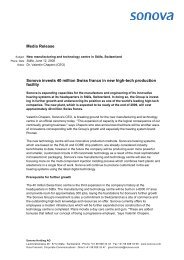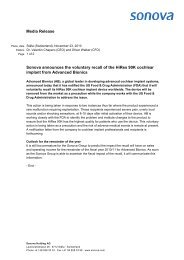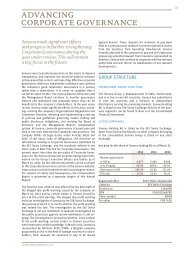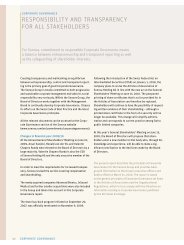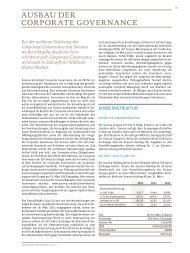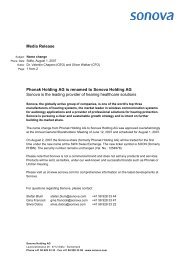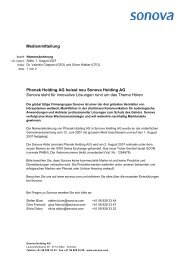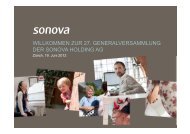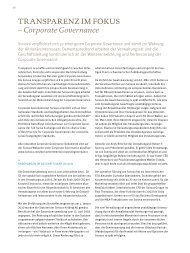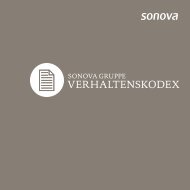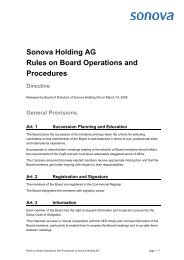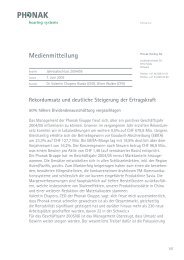Annual Report 2010/11 - Sonova
Annual Report 2010/11 - Sonova
Annual Report 2010/11 - Sonova
You also want an ePaper? Increase the reach of your titles
YUMPU automatically turns print PDFs into web optimized ePapers that Google loves.
2.3 Significant shareholders<br />
FINANCIAL STATEmENTS OF SONOVA HOLDING AG 153<br />
At year-end, the following significant shareholders were listed in the share register (with shareholdings in excess of 3% of<br />
the issued share capital):<br />
31.3.20<strong>11</strong> 31.3.<strong>2010</strong><br />
Beda Diethelm 9.99% 10.19%<br />
Andy Rihs 9.49% 10.68%<br />
Chase Nominees Ltd. 1) 8.19% 10.44%<br />
Hans-Ueli Rihs 5.70% 6.76%<br />
Nortrust Nominees Ltd. 1) 3.10%<br />
Registered shareholders with less than 3% 32.07% 35.70%<br />
Not registered 31.46% 26.23%<br />
1) Registered without voting rights.<br />
2.4 Risk assessment<br />
<strong>Sonova</strong> Holding AG, as the ultimate parent company of the <strong>Sonova</strong> Group, faces the same risks as the ones identified at<br />
Group level. Therefore, please refer to the disclosure of the Group-wide risk management procedures as described in Note<br />
24 of the Group’s consolidated financial statements.<br />
2.5 Compensation and shareholdings<br />
Content and method of determining the compensation and the shareholding programs<br />
The compensation principle of <strong>Sonova</strong> Group is to provide simple, transparent, performance-driven, and competitive<br />
compensation to all employees including executive management.<br />
The Nomination and Compensation Committee is responsible for reviewing and defining the structure and amount of<br />
compensation for the management Board and the Board of Directors, taking into account salary comparisons and publicly<br />
accessible information.<br />
Three elements are relevant for the Group: a fixed base salary, a variable compensation component that revolves around<br />
the respective financial year, and, for selected executive managers and employees, a long-term variable compensation<br />
component.<br />
Fixed salary component<br />
The fixed base salary gives each employee a regular and predictable salary that does not depend on the development of<br />
the <strong>Sonova</strong> Group’s business. The salary level is based on the functional profile, the market situation, and the employee’s<br />
skills. In its turn, salary progression depends primarily on the employee’s individual performance, the market value, and<br />
the economic climate.<br />
Variable salary component<br />
The variable salary is an integral element of the target income. The split between the fixed and variable salary components<br />
is a function of the job profile and respective management level. The targets for achieving the variable salary component<br />
are mutually defined and agreed upon in consultation with the employees at the beginning of the financial year. The variable<br />
salary component is generally 10% of the target salary for employees and 10–30% for managers. If the employee actually<br />
reaches less than 80% of the stipulated target, no variable salary component is paid out. If the targets are exceeded, the<br />
variable salary component may be a maximum of double the original amount. The amount paid out depends on the<br />
employee’s actual achievement of objectives by the end of the financial year and also on the overall performance of the<br />
<strong>Sonova</strong> Group or the respective unit.




